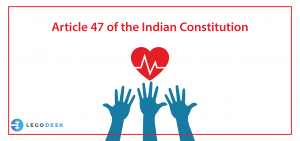Article 47 of the Indian Constitution
Introduction
The Constitution of India, 1950 lays down the Directive Principles of State Policy for the better functioning of the Nation. These Act as the driving force though not legally enforceable but guide to the state for its effective functioning. Directive Principles are listed from Article 39 to Article 50, Part IV of the Indian Constitution.
What does Article 47 say?
Article 47 is a direction to the state to raise the level of nutrition and standard of living. It suggests the primary duty of the state to be working towards improving public health. Since intoxicating drinks and drugs are injurious to health and thus state shall endeavor its prohibition except for medical purposes.[1] Article 47 enumerates the primary duties of the state, which is the most important factor for aiming at the betterment of society. This extending to maternity benefits, old age, advanced working conditions, safeguarding of justice increases the duties of the state.
Try Your All in one legal practice management software – Sign Up Now!
Public Health
Improving public health is a very important facet of this article. Right to health is now considered as an integral part of the fundamental rights. In working towards increasing the standard of living, the eradication of child labour, eradicating poverty, and improving the standard of living for women in society, the government should take the necessary steps.
In the case of Vincent Panikurlangara v Union of India[2], the court opined that public health should be ranked higher as they are the factors responsible for the betterment and growth of the society and in the building of the nation and therefore deserve high priority. Since the right of one person is correlating with the duty of another, so the right to health is directly proportional to the duty of the state as held in the case of Ram Lubhaya[3]. No matter how many schools and hospital are made and set-up, but until they benefit the general public, the state is not relieved of its duty.
In the case of Ratlam Municipal Corporation v Vardichand, the state is under the obligation to ensure that living conditions for the people are healthy and thus it can take action against any government or authority who stands in default after having the required financial resources to ensure public health and standard of living.
Read Also – Liquor Ban Removed from De-notified Highways
Standard of living
Right to food is enshrined under Article 21 as Right to life, which is fulfilled by the government fulfilling its duty under Article 47. To ensure the safety of food, the government is guided to set up food regulator. Since drugs can be beneficial and injurious, which totally depends upon the dosage and frequency. So, it will be ambiguous to declare a substance injurious without studying the substance in detail.
Liquor: Consumption and trade
The prohibition of liquor could find a place in the Constitution due to the puritanical thinking which dominated the constituent assembly. With respect to trade in liquor being a fundamental right, the Supreme court has failed to give a consistent view.
In exercising this power, the Bihar government issued a policy that aimed at the absolute prohibition of intoxicating drinks, and any household on whose premises liquor is found can be imprisoned for the same. This policy was issued after an unfortunate incident claimed 16 lives. But the same was struck down by Patna High Court on the grounds that it is misguided and lacked consistency.
Read Also – Article 136 of the Indian Constitution
The ambiguity of Article 47
The ban of liquor on the state and national highways for 500 meters was issued by the Supreme Court was criticized for being a judicial overreach. Because Article 47 is a directive principle and it is upon the direction and discretion of the government of the day. The Supreme Court modified its notification due to the cause of loss to the traders. The modification confined the ban to only 220 meters and states like Himachal Pradesh, Sikkim, and Meghalaya where population less than 20,000 were exempted from such ban.
Since the power is vested upon the state, the Supreme Court exercising such power was against the spirit of Separation of power. In light of the various controversies and conflict of judicial overreach, Article 47 as per the opinion of some known jurists is thought of as unconstitutional being a violation of the fundamental right to Liberty. The provision is ambiguous and illiberal.[4]
[2] AIR 1987 SC 990: (1987) 2 SCC 165
[3] State of Punjab and Ors v. Ram Lubhaya Bagga 26th February 1998
Try our Debt Resolution solutions today Request a Demo
